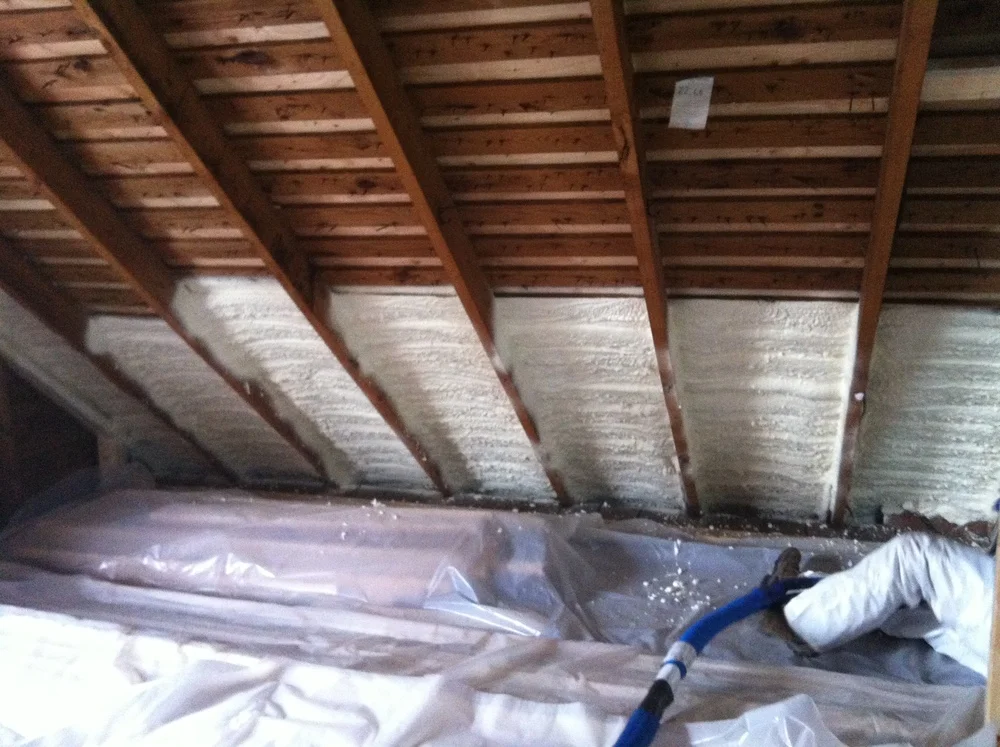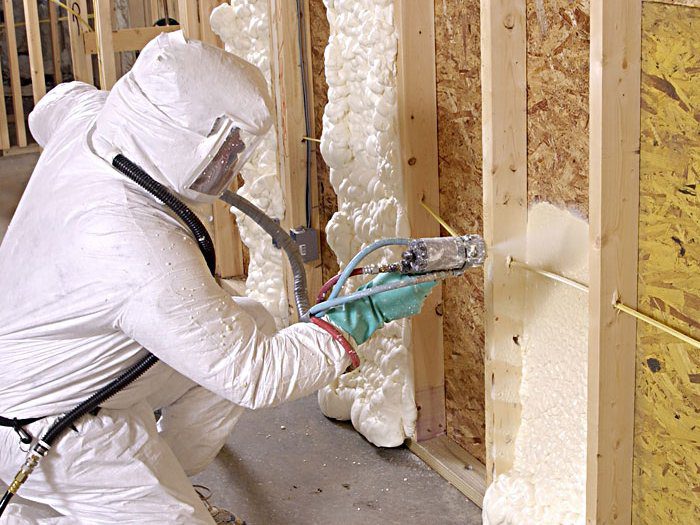Picking the Right Sort Of Spray Foam for Your Insulation Demands
Picking the Right Sort Of Spray Foam for Your Insulation Demands
Blog Article
Spray Foam: The Ultimate Remedy for Air Sealing and Insulation
Spray foam insulation has actually emerged as a leading service for efficient air securing and thermal insulation, offering a distinct mix of residential or commercial properties that establish it in addition to traditional techniques. Its capability to increase and fill spaces makes it specifically reliable in preventing air leakage, which can substantially influence energy performance. However, understanding the full range of its benefits, setup procedures, and contrasts with other insulation types is essential for making notified decisions. As we discover these facets, the effects for both brand-new building and constructions and retrofits come to be significantly substantial. What factors should influence your selection?
What Is Spray Foam?
Spray foam is a functional insulation product that integrates the principles of air securing and thermal resistance to improve energy effectiveness in buildings. Made up mostly of polyurethane or other comparable substances, spray foam is applied as a fluid that broadens upon contact with surface areas, producing a solid, continual layer of insulation. This special residential property enables it to fill up gaps, splits, and voids that typical insulation products may ignore, offering an exceptional air seal.
There are 2 primary kinds of spray foam: open-cell and closed-cell. Open-cell spray foam is lighter and a lot more flexible, using excellent sound absorption and a lower R-value per inch - Spray Foam. In comparison, closed-cell spray foam is denser, providing a greater R-value, dampness resistance, and added architectural integrity to constructing components
The application procedure generally includes specialized devices, making certain a seamless application that abides by various substratums, consisting of wood, concrete, and steel. This adaptability makes spray foam appropriate for both brand-new constructions and retrofitting existing structures. Its capability to develop an airtight obstacle significantly adds to lowering energy usage and enhancing interior air quality, consequently making it a preferred choice among building contractors and homeowners alike.
Advantages of Spray Foam Insulation
One of one of the most substantial benefits of spray foam insulation is its remarkable capability to produce a constant air barrier, which properly decreases energy loss. Unlike traditional insulation materials, spray foam expands to fill up spaces and fractures, making sure that air leak is drastically reduced. This characteristic not just improves power effectiveness however likewise results in reduce utility costs gradually.
Furthermore, spray foam insulation gives superior thermal resistance, contributing to a more secure indoor atmosphere. Its high R-value per inch allows for effective insulation in restricted rooms, making it excellent for attic rooms, walls, and crawl spaces. Additionally, the moisture-resistant residential or commercial properties of spray foam help prevent mold and mildew and mold growth, promoting much healthier living problems.
Another critical advantage of spray foam insulation is its sound-dampening qualities (Spray Foam). It effectively lowers noise transmission in between spaces, creating a quieter and extra comfortable home environment. The durability of spray foam additionally stands apart, as it does not droop or work out over time, preserving its performance throughout its life expectancy
Exactly How Spray Foam Works
Understanding just how spray foam insulation works is important for valuing its effectiveness in air securing and thermal resistance. Spray foam insulation includes 2 primary elements: isocyanate and polyol resin. When these elements are combined, they undergo a chemical response that causes the material to increase rapidly, producing a thick foam that fills cracks, tooth cavities, and gaps.
As the foam increases, it sticks to surfaces, developing an impermeable seal that significantly decreases air seepage. This particular makes spray foam insulation very effective at stopping drafts and dampness infiltration, which can lead to energy loss and damage in time. Furthermore, the closed-cell variation of spray foam supplies superior thermal resistance due to its rigid structure, efficiently lessening warmth transfer.
The one-of-a-kind residential or commercial properties of spray foam enable it to comply with irregular surfaces, guaranteeing detailed protection and a seamless barrier. As a result, spray foam insulation not only enhances energy performance yet additionally adds to boosted interior air high quality by minimizing the build-up of allergens and pollutants. Inevitably, recognizing the auto mechanics behind spray foam highlights its role as an exceptional choice for insulation and air securing in both household and industrial applications.
Setup Process Introduction

Prior to installation, the room must be effectively cleansed and prepped, guaranteeing that surface areas are devoid of debris, wetness, and dirt. This action is essential since impurities can endanger adhesion and overall performance. When the area is prepared, the application includes blending both parts of the spray foam, which increases upon contact and fills gaps efficiently.
Educated experts must perform the installment, making use of customized tools to make certain consistent insurance coverage and optimum thickness. Safety and security preventative measures, consisting of putting on safety equipment and making sure appropriate ventilation, are crucial throughout this process. After application, the foam usually remedies rapidly, forming a solid obstacle that improves energy efficiency.
Comparing Spray Foam to Typical Insulation
When assessing insulation options, spray foam insulation stands out get more in contrast to traditional products such as fiberglass and cellulose. Unlike fiberglass and cellulose, which can enable air seepage, spray foam expands upon application, filling voids and gaps to create an impermeable seal.
Additionally, spray foam gives a higher R-value per inch than typical insulation types, supplying more reliable thermal resistance in a thinner profile. This particular is particularly valuable precede with minimal tooth cavity deepness. Spray foam is resistant to moisture and mold growth, which can be a considerable worry with cellulose and fiberglass, specifically in Discover More moist atmospheres.
Nevertheless, spray foam insulation commonly lugs a greater in advance cost than its standard equivalents. Property owners need to consider this initial investment versus lasting power savings and performance benefits. Eventually, while both insulation kinds offer their purpose, spray foam becomes a much more sophisticated remedy for modern-day insulation needs, particularly in terms of air sealing and thermal effectiveness.

Conclusion
In summary, spray foam insulation represents a highly effective solution for this achieving optimum air securing and thermal resistance. Its one-of-a-kind properties, including dampness resistance and audio dampening, make it ideal for different applications in both new constructions and retrofitting projects (Spray Foam). Although the initial prices might be greater compared to traditional insulation products, the lasting advantages, such as considerable energy financial savings and boosted indoor air quality, justify the financial investment and highlight its value in modern-day structure practices.
Spray foam insulation has actually emerged as a leading solution for efficient air sealing and thermal insulation, supplying a distinct mix of residential properties that set it apart from typical techniques.Spray foam is a versatile insulation material that combines the principles of air securing and thermal resistance to enhance power efficiency in structures.When evaluating insulation choices, spray foam insulation stands out in comparison to standard products such as fiberglass and cellulose. Ultimately, while both insulation types offer their objective, spray foam emerges as an extra advanced option for modern-day insulation needs, specifically in terms of air sealing and thermal effectiveness.
In recap, spray foam insulation stands for a highly efficient remedy for achieving ideal air securing and thermal resistance.
Report this page